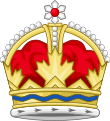Minister of Democratic Institutions
| Minister of Democratic Institutions | |
|---|---|
| Government of Canada | |
| Style | The Honourable |
| Member of | |
| Appointer | Governor General of Canada |
| Term length | At Her Majesty's pleasure |
| Inaugural holder | Jacques Saada |
| Formation | December 12, 2003 |
| Final holder | Karina Gould |
| Abolished | November 20, 2019 |
| Salary | $255,300 (2017)[1] |
| Website | www.DemocraticInstitutions.gc.ca |
 |
|---|
The Minister of Democratic Institutions (Template:Lang-fr) was a Minister of the Crown in the Canadian Cabinet, associated with the Privy Council Office. The position was abolished on November 20, 2019.
History
Under Martin (2003–2006)
The position was created by Prime Minister Paul Martin when he succeeded Jean Chrétien in December 2003 under the title Minister responsible for Democratic Reform to address the "democratic deficit", an issue Martin campaigned on when he ran for leader of the Liberal Party of Canada.
The portfolio was initially held by the Government House Leader, Jacques Saada, in Martin's first cabinet.[2] After the 2004 election, the portfolio was given to Mauril Bélanger, who was the deputy government house leader.
When Belinda Stronach crossed the floor from the Conservative Party to Liberals on May 17, 2005, she assumed responsibilities for the portfolio along with the post of Minister of Human Resources and Skills Development. At this point the title was changed from "Democratic Reform" to "Democratic Renewal".[3]
Under Harper (2006–2015)
Under the premiership of Stephen Harper, the post was first held by his first two House Leaders (Rob Nicholson and Peter Van Loan) as "Leader of the House of Commons and Minister for Democratic Reform". In 2008, the role was taken up by Steven Fletcher as "Minister of State (Democratic Reform)" and the same title was subsequently held by Pierre Poilievre.
Under Trudeau (2015–2019)
In the ministry of Justin Trudeau, who was elected on campaign promises of electoral reform, the portfolio was assigned to Maryam Monsef in November 2015, under the new title "Minister of Democratic Institutions".
In the mandate letter provided to Monsef by Trudeau, she has been instructed to table an action plan outlining proposals to reform the operations of the House of Commons of Canada in order to increase the role of individual Members of Parliament in the House and its committees. Proposals include allowing more free votes, giving committees more authority, increase research budgets, allowing chairs of house committees to be elected rather than appointed by the prime minister, giving MPs a role in choosing which committees they sit on rather than having them assigned by the prime minister or government house leader.[4] She oversaw the formation of the all-party Special Committee on Electoral Reform and appeared as its first witness.[5]
Following criticism of her handling of the portfolio, Monsef was named Minister of Status of Women on February 1, 2017 and Karina Gould was appointed in her place. On February 1, 2017, Gould announced that her mandate would no longer include exploring potential changes to the Canadian electoral system.[6]
On November 20, 2019, as part of Trudeau's Cabinet shuffle following the 2019 Canadian federal election, the Democratic Institutions portfolio was abolished. Joan Bryden of the Canadian Press reported that the position's responsibilities would be transferred to Dominic LeBlanc in his role as President of the Queen's Privy Council for Canada.[7]
List
Key:
| No. | Portrait | Name | Term of office | Political party | Ministry | |
|---|---|---|---|---|---|---|
| Minister for Democratic Reform | ||||||
| 1 | 
|
Jacques Saada | December 12, 2003 | July 20, 2004 | Liberal | 27 (Martin) |
| 2 | 
|
Mauril Bélanger | July 20, 2004 | May 18, 2005 | Liberal | |
| Minister for Democratic Renewal | ||||||
| 3 | 
|
Belinda Stronach | May 18, 2005 | February 6, 2006 | Liberal | |
| Minister for Democratic Reform | ||||||
| 4 | 
|
Rob Nicholson | February 6, 2006 | January 4, 2007 | Conservative | 28 (Harper) |
| 5 | 
|
Peter Van Loan | January 4, 2007 | October 30, 2008 | Conservative | |
| 6 | 
|
Steven Fletcher | October 30, 2008 | May 18, 2011 | Conservative | |
| 7 | 
|
Tim Uppal | May 18, 2011 | July 15, 2013 | Conservative | |
| 8 | 
|
Pierre Poilievre | July 15, 2013 | November 4, 2015 | Conservative | |
| Minister of Democratic Institutions | ||||||
| 9 | 
|
Maryam Monsef | November 4, 2015 | February 1, 2017 | Liberal | 29 (J. Trudeau) |
| 10 | 
|
Karina Gould | February 1, 2017 | November 20, 2019 | Liberal | |
References
- ^ "Indemnities, Salaries and Allowances". Parliament of Canada.
- ^ "Order in Council P.C. 2003-2027". Privy Council Office, Government of Canada. 2003-12-12. Retrieved 2015-11-13.
- ^ "Order in Council P.C. 2005-0950". Privy Council Office, Government of Canada. 2005-05-17. Retrieved 2015-11-13.
- ^ Justin Trudeau. "Minister of Democratic Institutions Mandate Letter". Prime Minister of Canada.
- ^ Wherry, Aaron (July 6, 2016). "Maryam Monsef tells Commons committee first-past-the-post voting system is 'antiquated'". CBC News. Retrieved February 10, 2017.
- ^ Wherry, Aaron (February 1, 2017). "Opposition cry 'betrayal' as Liberals abandon electoral reform". CBC News. Retrieved February 10, 2017.
- ^ Bryden, Joan (November 22, 2019). "Dominic LeBlanc's role, who's in charge of regional agencies becoming clearer". National Post. The Canadian Press. Retrieved November 23, 2019.
